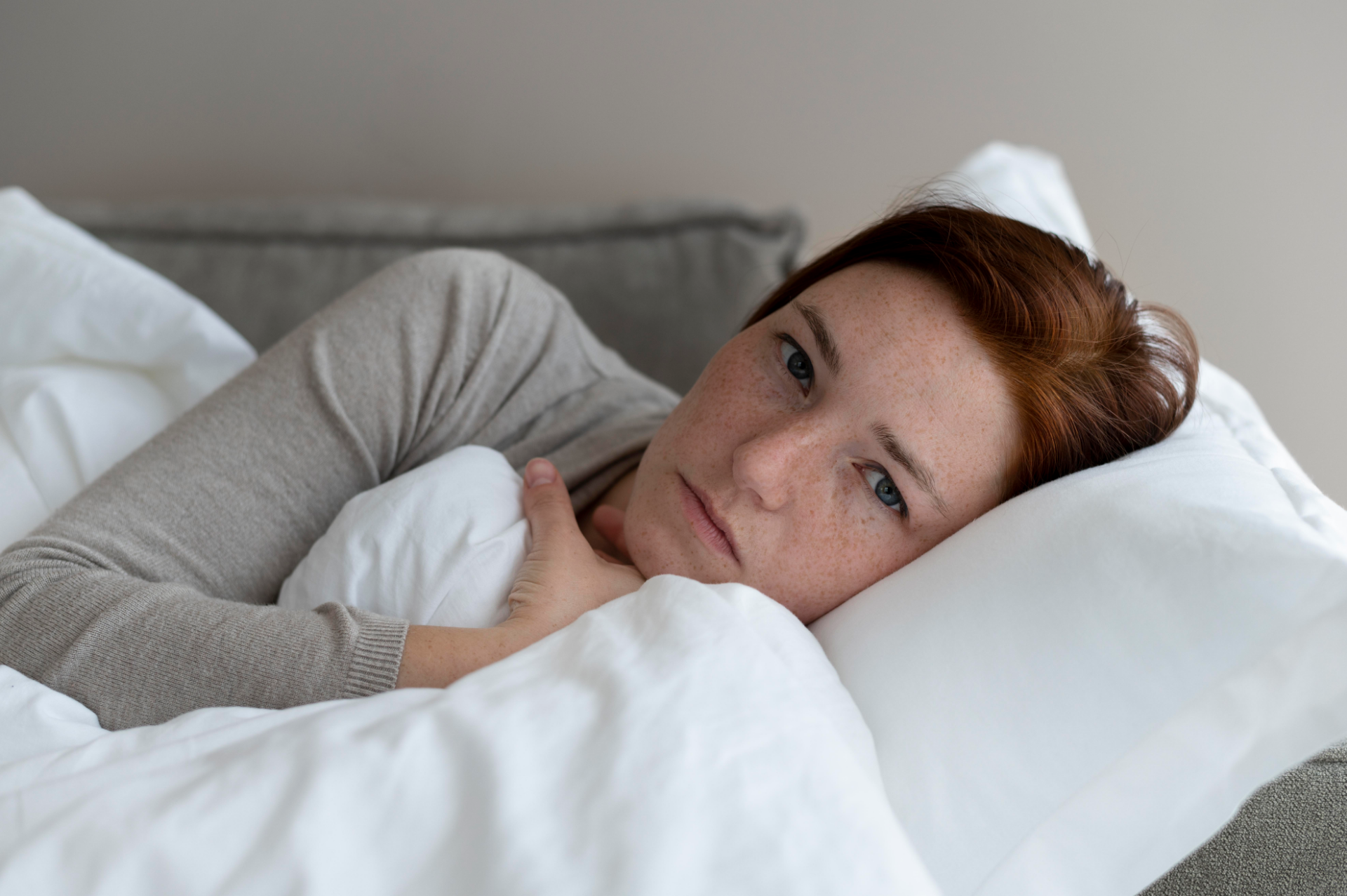Table of Contents
Insomnia is a sleep disorder that causes difficulty falling, staying, and maintaining sleep. Insomnia means people cannot fall asleep for a short period; even if they do, they cannot stay asleep because they cannot sleep deeply, and if they wake up, they cannot go back to sleep. Generally, changing sleep habits can help insomnia, but medication can also be used if there is another underlying disease.
What is Insomnia?
Insomnia is a sleep disorder in which there is difficulty falling asleep or staying asleep due to frequent waking, waking up after waking up, or waking up too early and not being able to go back to sleep. Insomnia may be short-term (acute) or affect the person chronically.
Insomnia is divided into three parts according to the duration of the complaint: acute or transient insomnia if the complaint lasts less than one week, subacute insomnia if it lasts between one week and three months, and chronic insomnia if it lasts more than three months.
Insomnia, a common disorder worldwide, affects people of all ages and genders. Insomnia, the causes of which may vary depending on the person, usually occurs due to factors such as constant changes in sleeping hours, eating before sleep, stress-related depression, and alcohol.
Insomnia, which can cause various problems in the social environment and work life of the person, makes people feel bad mentally and physically. This feeling is a psychological reflection of insomnia.
Difficulty falling asleep at night, frequent sleep interruptions, waking up early in the morning, decreased energy during the day due to insomnia, and an aggressive, tense personality structure are among the common symptoms of insomnia.
Insomnia usually improves with a change in sleep patterns, but if a medical condition causes insomnia, medication may be recommended.
What Causes Insomnia?
Common underlying causes of insomnia are:
- Stress-induced depression
- Eating before sleep
- Constant change in sleeping hours
- Sleep apnea
- Neurological diseases
- Hormonal problems
- Restless leg syndrome
- Alcohol consumption
- Lack of exercise
Diseases such as overactive thyroid gland and heart failure can also be added to these causes.
The most common causes of insomnia can be listed as follows:
- Stress-related depression
- Eating before sleep and drinking tea and coffee
- Constant change in sleep time
- Sleep apnea
- Neurological diseases
- Hormonal problems
- Restless leg syndrome
- Alcohol consumption
- Lack of exercise
- Overactive thyroid gland
- Heart failure
- Some antidepressants, asthma, or blood pressure medicines
What are the Symptoms of Insomnia?
If you have difficulty falling asleep at night, if your sleep is constantly interrupted, or if you suffer from both, these symptoms are signs of insomnia. In addition to these, waking up early in the morning, low energy during the day, a tense and aggressive mood, inability to focus during the day due to poor concentration, and frequent mistakes are symptoms seen in people with insomnia.
The following symptoms may indicate insomnia:
- Difficulty falling asleep
- The constant interruption of sleep
- Waking up early in the morning
- Low energy during the day, fatigue
- Tense and aggressive mood
- Inability to focus due to concentration disorder
- Making frequent mistakes at work or in everyday life
What does lack of sleep lead to?
Sleep is one of the main factors required for people to lead a healthy life. People with sleep problems have a reduced quality of life, and their mental and physical health is negatively affected.
Insomnia can also lead to the following problems:
- Lack of attention during the day, feeling tired
- Extreme irritability with difficulty concentrating,
- Decline in work performance,
- Depression
- High blood pressure and metabolic disorders
- Obesity risk
- Weakening of the immune system
How is Insomnia (Insomnia) Diagnosed?
To diagnose insomnia, the patient’s complaints and symptoms are first addressed. After these investigations, a blood test can be performed to examine the presence of a medical disease. Neuroimaging, especially magnetic resonance imaging (MRI), is one of the most useful tools for identifying sleep disturbances.
Can MRI show sleep deprivation?
Yes, MRI can show the effects of sleep deprivation. Studies have found that 24 hours of sleep deprivation leads to measurable reductions in cortical thickness and changes in functional connectivity in the brain, as detected through MRI. These findings demonstrate that MRI is a sensitive tool for detecting the rapid impact of sleep deprivation on brain structure and function.
How is insomnia treated?
First, the treatment of insomnia should involve investigating its causes and origins—some patients suffering from insomnia benefit significantly only from regulating their sleeping habits. Insomnia patients should be informed about some rules regardless of the reason.
Depending on the type of insomnia, life adjustments should be made as a priority, and then drug treatments such as melatonin supplements should be preferred.
Chronic insomnia can be caused by mistakes made during the day or by other conditions such as sleep apnea, restless legs syndrome, or nocturnal panic attacks. Instead of opting for medication for a comfortable quality sleep, it is necessary to identify the main problem causing insomnia and plan a treatment accordingly.
What should be considered in drug treatment for insomnia?
Psychiatric diseases are frequently encountered as the underlying causes of insomnia. Affective disorders such as depression can lead to insomnia. If insomnia is of psychiatric origin, treatment should be applied according to the cause. In cases where insomnia is temporary, primarily or short-term, sleeping pills (hypnotics) can be used for no more than one week.
In principle, chronic insomnia is not treated with sleeping pills. If necessary, sleeping pills (hypnotics) can be given under the supervision of a doctor for no longer than 4-6 weeks to break the tension in the patient.
Sleeping pills that patients use randomly without a doctor’s advice may have negative consequences. This is because patients develop tolerance to this type of medication over time. In other words, the dose may increase over time for the same effect. If the drugs are discontinued, the complaint of insomnia returns in a more severe form.
What is Good for Insomnia?
If you want to prevent insomnia and have better quality sleep, first of all, pay attention to your sleep patterns, go to bed at the same time, and get up at the same time. However, it would help if you did not prevent night sleep by sleeping during the day. You can also exercise to tire the body and make it easier to fall asleep. On the other hand, you should not eat anything before bed, you should not consume tea and coffee, and you can take melatonin supplements if necessary.
The methods that are good for insomnia can be listed in more detail as follows:
- Go to bed at the same time and get up at the same time
- Sleep in a dark room, away from electronic devices
- Try not to sleep during the day
- Make it easier to fall asleep by doing light exercises and tiring the body
- Do not eat; do not drink tea and coffee before going to bed
- Drink chamomile tea, melissa tea, and milk to induce sleep
- Avoid stress
- Turn to meditation for its relaxing properties
- Eat a regular and healthy diet
- Eliminate alcohol from your life
- Take melatonin supplements if necessary
Frequently Asked Questions about Insomnia
What is sleep?
Sleep is a period of both physical rest and renewal of mental functions. Regular sleep is essential for physical and psychological health.
Insomnia and disturbances in sleep patterns negatively affect human health, from the immune system to heart health, from blood sugar levels to brain functions. The person’s biological clock creates the order and distribution (rhythm) of sleep during the day. Light is one of the most important factors guiding a person’s biological clock. Light perceived by the eyes reaches the relevant center in the brain, which, depending on the amount of light (day or night), sends stimulating or inhibitory messages to the centers that secrete substances and hormones that induce sleep or wakefulness (i.e., things that prevent sleep). This means that there are times when people are predisposed to sleep or cannot easily fall asleep if they want to.
What are the benefits of sleep?
During sleep, stress hormones decrease, and the body repairs restructures, and prepares itself for the new day. Regular sleep reduces anxiety (anxiety disorder) and depression; children who sleep regularly have a stronger memory, and regular sleep reduces the risk of hyperactivity in children.
What is the ideal sleep duration?
Sleep duration varies from person to person due to genetic factors and is as individualized as a fingerprint. Although it varies from person to person, it is known that it varies between 4 and 11 hours.
Generally, an average of 7-8 hours of sleep is sufficient for adults. As in adults, sleep duration and hours in children vary according to the effect of genetic factors.
What does insomnia indicate?
In particular, people with chronic insomnia may be a harbinger of chronic pain in the body, diabetes, heart disease, asthma, gastroesophageal reflux disease (GERD), overactive thyroid, depression, Parkinson’s disease, and Alzheimer’s disease.
Is insomnia the only sleep disorder?
Among the more than 80 sleep disorders that have been identified, insomnia is the one that disturbs people the most about their sleep and is the biggest complaint that they are aware of regarding sleep problems. In fact, the majority of patients who consult a doctor for sleep problems complain of insomnia. On the other hand, excessive sleepiness, that is, constant sleepiness during the day and tired waking up, can be ignored and considered normal by many patients.
Insomnia is only one of the dozens of sleep disorders that have been identified, and patients who consult a doctor may ignore more vital or urgent conditions in terms of their consequences. A sleep disorders specialist should first examine a patient suspected of having a sleep disorder.
Sometimes, the patient can be diagnosed by examination alone, and sometimes, sleep tests can reveal the underlying causes. The necessary tests can be performed at the patient’s home or a sleep disorders center.
Does chronic insomnia increase the risk of Alzheimer’s?
If a person with chronic insomnia also has Alzheimer’s risk genes, the risk of Alzheimer’s is much higher. This is because when too much sleep is lost, amyloid in the brain increases and damages the brain.

